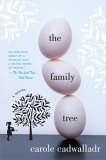Summary | Excerpt | Reading Guide | Reviews | Readalikes | Genres & Themes | Author Bio

Critics' Opinion:
Readers' Opinion:
First Published:
Jan 2005, 416 pages
Paperback:
Nov 2005, 416 pages
Part One
beginning n 1 : time at which anything begins; source; origin
1.1 : fate n 1 : power predetermining events unalterably from eternity
2 : what is destined to happen
3 : doomed to destruction
The caravan entered our lives like Fate. Although from the outside, it looked like a Winnebago.
It appeared one morning in our driveway, an alien spaceship from a planet more exciting than our own. Inside, there was a miniature stove with an eye-level grill, and a fridge that was pretending to be a cupboard. Tiffany and I, experienced sniffers of nail-polish remover, stood on the threshold and inhaled the slightly toxic smell of new upholstery and expectation. I was eight years old and susceptible to the idea that technology could change your life. They said so in the TV ads.
I have a photograph from that day. We're standing in the driveway, smiling, certain, shoulders locked together in a single row. It reminds me of one of those Soviet posters from the thirties: the Family Monroe, brave pioneers of a new type of holiday, proudly facing the future together. The sun is making me squint, and my mother must have blinked, because her eyes are shut, but otherwise I'd say we looked happy.
The caravan itself is blurred in the picture. A hazy beige outline that befits its semi-mystical presence in our midst. As a family, we'd never been that keen on the outdoors, generally preferring indoor activities such as playing cards or bickering. But we stood in thrall to the brave new world it represented. We'd all read the accompanying brochure and knew that the caravan allied the power of progress with the concept of free will: we would Travel in the Modern Way and Go As We Pleased. Although we never did. We went where our mother told us, which turned out to be Norfolk.
There she is now, breaking free from the frame of the photo and walking back inside. There is a joint of pork that requires her attention, a hall carpet that must be vacuumed, a freezer compartment that needs defrosting. She tip-taps her way back up the driveway, her hairsprayed curls bouncing up and down, a small, contented smile playing at the corners of her lips. I've never been much good at divining what goes on beyond the net curtains of her eyes, but my guess is that she is thinking about the new fitted kitchen that will one day be hers. I can sense beige Formica units and a built-in oven hovering just beyond the field of my perception.
Am I exaggerating the role of the caravan in our family history? Or embellishing it? I'm not sure. Alistair's the one who believes in fate, although he calls it "genetic predisposition." But then he has his reasons for this. I'm more skeptical, I'll admit. But then, as you'll see, I have my reasons for this too.
Alistair's my husband. But perhaps you've heard of him already. Alistair Betterton? The author of Destiny's Child: Nature Versus Nurture in the Age of the Genome? If you look on page seven of the first edition, you'll find me. "To my darling wife," it says. I didn't make the second edition, but apparently this was due to lack of space.
If I wasn't married to Alistair, I suspect that I'd tell this story differently. But I know what I know. He showed me a gene map once. It was like a temperature chart or a rainfall map, with Europe portrayed as colored contours. It showed how populations have merged and blended, how you can track the passage of people across continents by the DNA left behind in the cells of their descendants. That's you, Alistair said, and me. We are a sum of the past. Don't you mean we are the sum of our past? I said. No, he said, we're the sum of other people's pasts. We're made up of other people's genes. We're the bits they leave behind.
From The Family Tree by Carole Cadwalladr, pages 1-17. All rights reserved. No part of this book maybe reproduced without written permission from the publisher.





The Flower Sisters
by Michelle Collins Anderson
From the new Fannie Flagg of the Ozarks, a richly-woven story of family, forgiveness, and reinvention.

The House on Biscayne Bay
by Chanel Cleeton
As death stalks a gothic mansion in Miami, the lives of two women intertwine as the past and present collide.

The Funeral Cryer by Wenyan Lu
Debut novelist Wenyan Lu brings us this witty yet profound story about one woman's midlife reawakening in contemporary rural China.
Your guide toexceptional books
BookBrowse seeks out and recommends the best in contemporary fiction and nonfiction—books that not only engage and entertain but also deepen our understanding of ourselves and the world around us.